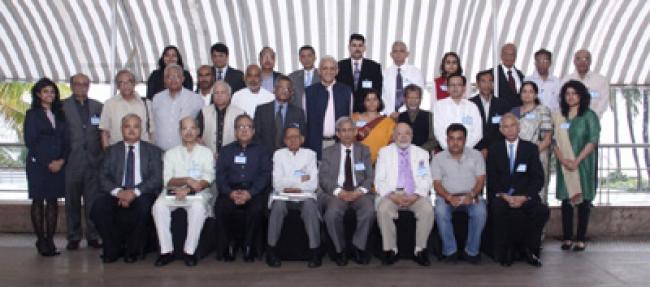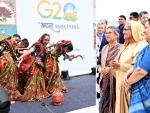Column

Restructure Indo-Bangla river commission: Roundtable
Mumbai, July 13 : An India Bangladesh roundtable on Blue Peace in the Eastern Himalayas, held in Mumbai recently, has called for restructuring the joint river commission for a long term cooperation on trans-boundary water issue.
Convened by the Strategic Foresight Group(SGF), a think-tank engaged in crafting new policy concepts to help policy makers prepare for future, the roundtable was co-chaired by Ambassador Tariq Karim, Bangladesh High Commissioner in New Delhi and Prof Muchkund Dubey, former Foreign Secretary of India. Altogether 25 senior diplomats, Members of Parliament, former ministers and experts from India and Bangladesh attended the two-day meeting from July one.
Dr Sundeep Waslekar, President of Strategic Foresight Group said, “The roundtable emphasized the importance of creating robust and sustainable institutions for collaborative water management which can withstand short term political dynamics. In this context, the current functioning of the Joint Rivers Commission is extremely inadequate as there are in effect two parallel national river commissions, instead of one joint commission."
"It is necessary to establish an India Bangladesh Joint Rivers Commission headed by a prominent Indian or Bangladeshi leader on an alternative basis," he said.
Dr.Waslekar proposed that the Commission should have a team comprising nationals from both the countries who can undertake necessary activities for sustainable management of shared water resources in a joint and collaborative manner. It is also important for the Joint Rivers Commission to have an arbitration clause with a well defined mechanism to resolve differences and conflict of interests, he observed.
The roundtable stressed on the importance of taking into account the impact of climate change on water resources in the river basins shared by India and Bangladesh. As climate change can influence floods, droughts, sea level, rainfall and salinity, any long term planning for the sustainable management of water resources must take into account the potential impact of climatic and environmental factors.
It observed that any effort for sustainable management for water resources in trans-boundary resources would only be meaningful if there is also efficient utilization and quality control of resources within the countries. Therefore, the roundtable emphasized the significance of sound water governance and pollution control in domestic and international waters alike.
The participants were optimistic about the prospects of India and Bangladesh for sustainable management of water resources because of the new trends in cooperation for conservation and governance of natural resources.
The two countries have already agreed on a programme of collaboration for preserving the ecology of Sunderbans, and particularly replenishing the fresh water supply to the area. There is also an agreement for joint Environmental Impact Assessment and sharing of information with regards to the Tipaimukh project. More such agreements are under discussion.
With this existing spirit of cooperation, it should be possible to construct sustainable institutions for cooperation such as the reinvention and restructuring of Joint Rivers Commission, the participants observed. Moreover, it will be appropriate to explore how water cooperation can be used as an instrument of broader economic cooperation by increasing connectivity, harnessing the energy potential, exploring eco tourism and other innovative commercial activities for improving livelihood conditions of the people in the basin. The roundtable concluded with confidence in the prospects of bilateral cooperation between India and Bangladesh driven by cooperation in shared water resources achieving a momentum with support from all political forces and other stakeholders in the two countries.
The roundtable took place at a time when relations between India and Bangladesh are improving, particularly since the visit of the Prime Minister of Bangladesh to India in 2010 and the Indian Prime Minister to Bangladesh in 2011. There are unresolved issues with regards to trans-boundary water resources which need to be addressed urgently and earnestly in the spirit of good faith and cooperation that currently exists between the two countries.
As experts observe, it is necessary and possible to finalize the Teesta river agreement, bearing in mind the importance of environmental flows for sustenance of the river and ecological security of the basin. However, in the long run it is not feasible to negotiate a separate agreement for each of the 54 trans-boundary rivers between India and Bangladesh.
It is necessary to move towards integrated collaborative and sustainable management of all shared rivers between the two countries as it is necessary to apply the principles of Integrated Water Resource Management to the entire Ganges-Brahmaputra basin shared by India and Bangladesh.
Considering that many of the rivers shared by India and Bangladesh originate from third countries, it is also important to have a gradual multilateral approach towards including third countries in the process of water cooperation.
The roundtable welcomed the trilateral talks between India, Bangladesh and Bhutan and the possibility of similar talks between India, Bangladesh and Nepal in the future. In the long term it would be necessary to explore ways of cooperation between all countries in the Eastern Himalayan river systems.
The participants included Dr Gowher Rizvi, Chief Advisor to Prime Minister of Bangladesh, Ambassador Sabihuddin Ahmed, Advisor to the Chairperson of Bangladesh Nationalist Party, Barrister Anisul Islam Mahmud, former Foreign Minister and leader of Jatiya Party-Ershad. The Indian participants included BJP Leaders Anil Dave, former Minister Dr Sanjay Paswan and Leader of West Bengal BJP Tatagatha Roy, Congress MP Sanjay Nirupam and Rajan Medhekar, former Head of National Security Guards.



